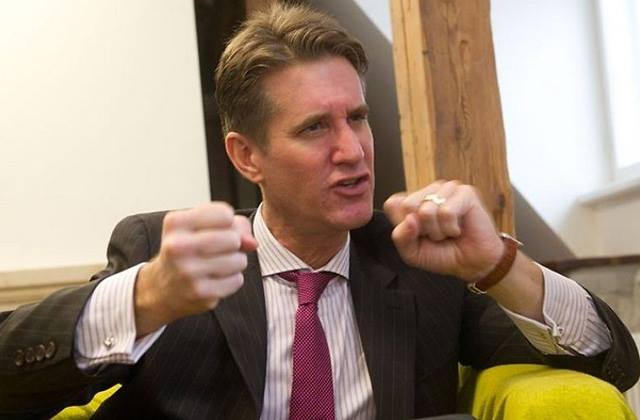This All Sends a Chilling Message to the Parties to the Conflict that President Putin Holds all the Cards: Matthew Bryza

Interview with Matthew Bryza, former US Ambassador to Azerbaijan, Former US Assistant Secretary of State for the South Caucasus.
—Intense battles broke out in Nagorno-Karabakh and Ziyafat Askerov , First Deputy Speaker of Azerbaijani parliament, was quoted by Azeri media, confirming that the Azerbaijani army has indeed launched a large scale military assault on Armenian forces on 2 April. How do you explain this situation especially taking into consideration the fact that fighting began when Aliyev and Sargsyan were in Washington DC?
—As is usually the case for violence along the Line of Contact, each side is accusing the other of initiating the clashes, and reliable information to determine who shot first is not available. The occurrence of these, the most serious armed clashes between Armenia and Azerbaijan since 1994 at the very moment that both Presidents Aliyev and Sargsyan are in Washington, DC, suggests neither President ordered the launch of the fighting. Indeed, this outbreak of violence undercuts the key objective of both presidents to attract higher-level U.S. involvement in mediation efforts, as reflected in their separate meetings with Vice President Biden. Speaking from experience, no U.S. Vice President or President will consider getting personally involved in this sort of mediation effort if the parties’ presidents appear to be initiating new fighting. So, my guess is, a local commander from one side or the other initiated the fighting, perhaps encouraged by an outside entity.
—Mr. Bryza, it’s already a few months Armenian experts, and not only them, are discussing how regional developments may affect the situation on our conflict zone. So it is interesting to know, what external actors do you see interested in such an escalation? For instance, many think that Turkey or Russia may be interested pursuing different purposes.
—Turkey is certainly not interested in renewed armed conflict on another of its borders. Turkey already has enough difficulty with regard to the wars in Iraq and Syria along its southern border. Realizing this, Russia may believe this renewed fighting could serve several of its interests at the same time.
First, as just noted, renewed armed conflict between Azerbaijan and Armenia causes a new headache for Turkish President Erdogan, which Putin has been keen to do since Turkey shot down a Russian military aircraft on November 24 that was violating Turkish airspace. Second, the violence erupted just one day after Presidents Aliyev and Sargsyan met separately with U.S. Vice President Biden in a meeting many observers hoped would reenergize the Minsk Group. Instead, the worst clashes since the war in the early 1990’s occur simultaneously with this promising meeting in the White House on the margins of a larger gathering hosted by President Obama, whose invitation Russian President Putin refused to accept.
Perhaps all this timing is just coincidental. Perhaps the current situation is fundamentally different from August 2008, when Russia took advantage of world leaders being distracted by the opening ceremony of the Beijing Olympics to invade Georgia, or when he did the same in February 2014 during the opening of the Sochi Olympics and launched military operations in Ukraine. In any case, it is essential that the Presidents of the Minsk Group Co-Chair countries work together to help de-escalate the current violence and invigorate the peace process.
—Minsk group, presidents of co-chair countries, international organizations already assessed the situation calling on the sides to observe ceasefire regime, as always nothing more. Minsk group co-chairs should even meet in Vienna tomorrow. This situation shows, that the international community doesn’t have power on the sides, and especially on Azerbaijan, the president of which is able to resume fighting even being in Washington DC and having meetings with the U.S. officials, discussing NK conflict, and even discussing mechanisms that U.S. congressmen are suggesting to implement ceasefire violations. What does this mean?
—This all means that it is up to the parties to the conflict, not to the international community, to stop the fighting and reinvigorate negotiations on a political settlement. Mediators and other well-intended outsiders can help only when the leaders and the societies of the warring parties are willing to compromise.
That said, the official statement of the Minsk Group is weak. It sounds like it could apply to any of the numerous ceasefire violations that have, in fact, been occurring nearly continuously in recent years.
But, the current escalation in violence is unprecedented and merits a similarly unprecedented statement and effort by the Minsk Group.
—How do you assess your country’s efforts? How do you see role of the U.S. in this situation?
The U.S. reaction has been far too weak. As of this moment, there has been no official statement from the White House about this unprecedented escalation of violence, and a single press release by Secretary of State Kerry. Only the Russian President and his foreign and defense ministers have taken any concrete steps calling for de-escalation. This all sends a chilling message to the parties to the conflict that President Putin holds all the cards. The ramifications of this sense of U.S. disengagement could be serious, not only with regard to Azerbaijan and Armenia, but also for Ukraine and Syria.
By Araks Martirosyan

























